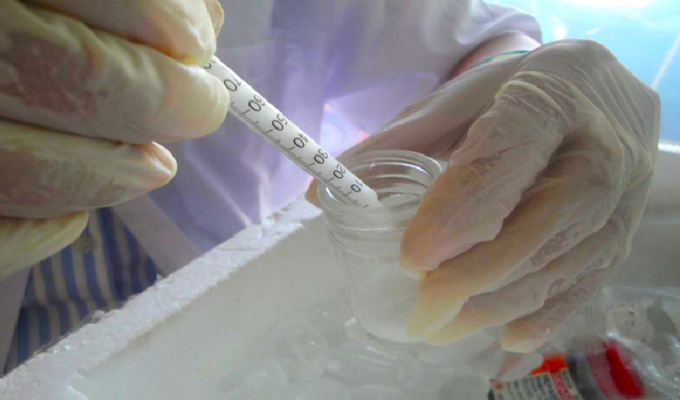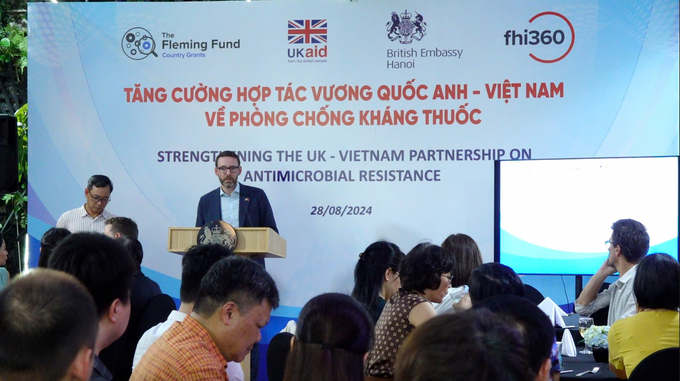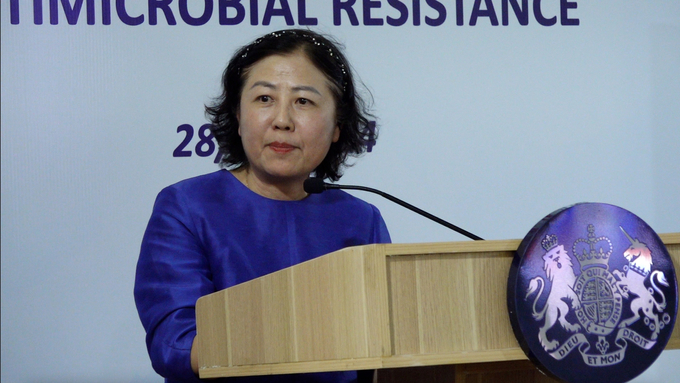The UK and Vietnam have both committed to being responsible international partners in antimicrobial resistance management.
On 28 August, the British Embassy in Hanoi, in collaboration with Family Health International (FHI 360), co-hosted the launch of Phase II of the UK-funded £3.4 million Fleming Fund Country Support Programme to continue tackling antimicrobial resistance in Vietnam.
The Fleming Fund, managed by the UK Government, aims to support low- and middle-income countries to improve their antimicrobial resistance surveillance systems, increase laboratory capacity and promote the use of quality data to inform decision-making in tackling the growing problem of antimicrobial resistance.
 The Fleming Foundation has played an important role in enhancing Vietnam’s capacity to address antimicrobial resistance. Photo: TT.
The Fleming Foundation has played an important role in enhancing Vietnam’s capacity to address antimicrobial resistance. Photo: TT.
Phase II of the Programme demonstrates the UK’s commitment to Vietnam in its continued efforts to tackle antimicrobial resistance. The event also reinforced the role and importance of national systems for monitoring antimicrobial resistance, use and consumption in the health, veterinary and environmental sectors.
With the participation of government partners, development organisations and stakeholders, the event highlighted the spirit of partnership that underpins the UK Government’s approach to combating antimicrobial resistance, recognised Vietnam’s efforts and demonstrated our shared commitment to tackling one of humanity’s most pressing health challenges.
 British Ambassador to Vietnam Lain Frew acknowledged Vietnam’s pioneering role in addressing the issue of antimicrobial resistance. Photo: Thanh Thuy.
British Ambassador to Vietnam Lain Frew acknowledged Vietnam’s pioneering role in addressing the issue of antimicrobial resistance. Photo: Thanh Thuy.
British Ambassador to Vietnam Lain Frew acknowledged Vietnam’s pioneering role in tackling antimicrobial resistance. The Ambassador said: “The UK and Vietnam are both committed to being responsible international partners in antimicrobial resistance management. Phase II of the Flemming Fund will continue our efforts to not only improve antimicrobial resistance management in Vietnam but also set a model for other countries facing similar issues, to strengthen global antimicrobial resistance cooperation.”
Dr. Nguyen Thi Thu Nam, Country Director of FHI 360 in Vietnam, shared that the Fleming Foundation has played an important role in enhancing Vietnam’s capacity to address antimicrobial resistance. FHI 360 is committed to working closely with partners, accelerating the achievements and striving to create sustainable impacts in the future.
From May 2019 to April 2024, FHI 360 has coordinated with government agencies and implementing partners in Vietnam to successfully implement Phase I of the Program with a funding source of 8.8 million GBP.
 Ms. Nguyen Thu Thuy, Deputy Director of the Department of Animal Health (Ministry of Agriculture and Rural Development) said that in phase I of the Program, all laboratories have been strengthened with technical capacity in data management and reporting, and biosafety and biosecurity. Photo: Thanh Thuy.
Ms. Nguyen Thu Thuy, Deputy Director of the Department of Animal Health (Ministry of Agriculture and Rural Development) said that in phase I of the Program, all laboratories have been strengthened with technical capacity in data management and reporting, and biosafety and biosecurity. Photo: Thanh Thuy.
On the side of the Ministry of Agriculture and Rural Development, Ms. Nguyen Thu Thuy, Deputy Director of the Department of Animal Health, informed that in phase I of the Fleming Fund National Support Program for Vietnam, under the coordination of FHI 360 Vietnam, three veterinary laboratories were supported and participated in the national surveillance system for antimicrobial resistance in the veterinary sector.
During the program, the laboratories were strengthened with technical capacity in data management and reporting, biosafety and biosecurity, and information management. In addition, the laboratories received support in infrastructure renovation and equipment procurement.
To date, the National AMR surveillance has been conducted annually by the Department of Animal Health in 15 provinces during 2021-2023 with the support of the Fleming Foundation. Antimicrobial resistance data have been reported to the AMR portal and analyzed by WHONET software (a microbiology laboratory data management and analysis program).
Antimicrobial resistance data have been shared with the authorities of 15 provinces and three AH laboratories and used by Thanh Hoa, Dong Nai and Ho Chi Minh City as a reference for planning, developing and implementing provincial active antimicrobial resistance surveillance in 2023.
A national antimicrobial resistance surveillance network was established in 17 laboratories, 3 National Reference Laboratories in the health sector and 3 veterinary laboratories. The main achievements were the enhancement of technical capacity, data management and reporting, biosafety and biosecurity practices, improvement of information management systems, infrastructure renovation and equipment supply for laboratories.
The event also recognized the effectiveness of intensive training programs and workshops to improve the quality of human resources, develop documents and operational guidelines on antimicrobial resistance surveillance.
These efforts have paved the way for active surveillance of antimicrobial resistance in pigs and chickens, supporting the national strategy for a One Health approach, promoting a unified approach to knowledge sharing on antimicrobial resistance.
Phase II of the Programme is committed to be implemented in Vietnam from May 2024 to December 2025. The objective is to improve the capacity, diagnostics and reporting of antimicrobial resistance and strengthen the National System for surveillance of antimicrobial resistance, management of antibiotic use and consumption in the health, veterinary and environmental sectors through a One Health approach.
Linh Linh – Thanh Thuy
Vietnam Agriculture Newspaper
